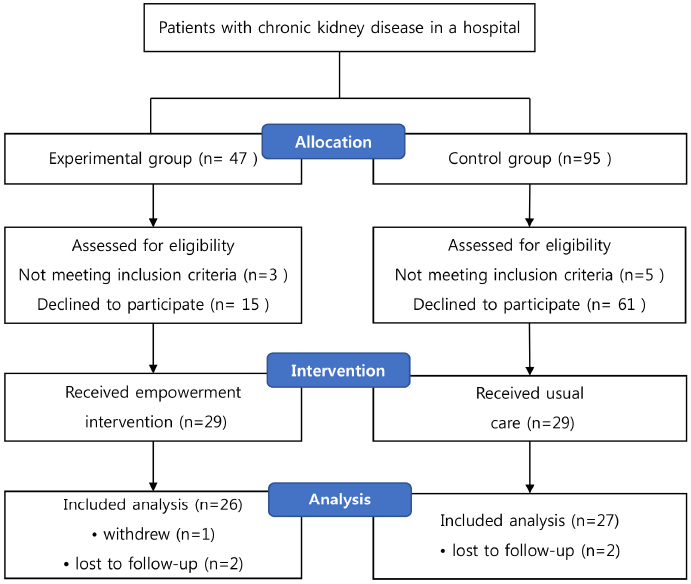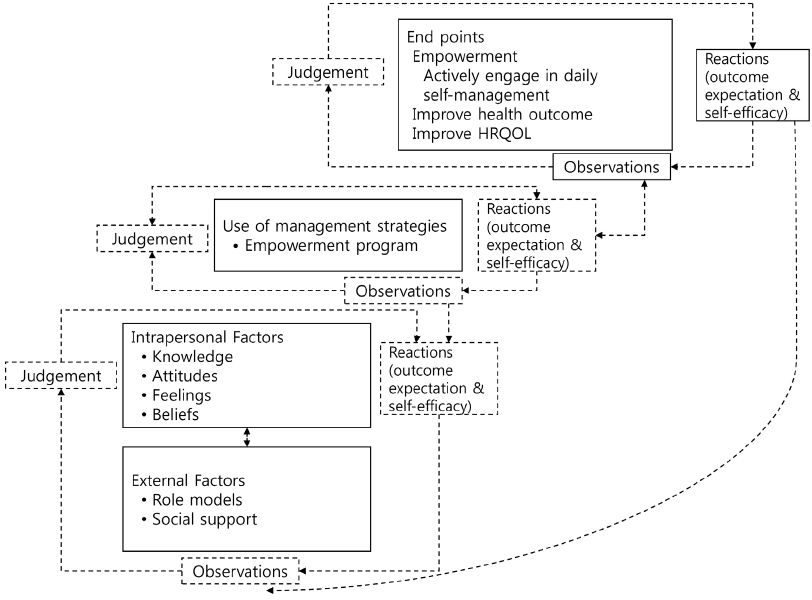Korean J Adult Nurs.
2018 Aug;30(4):426-436. 10.7475/kjan.2018.30.4.426.
An Empowerment Program to Improve Self-Management in Patients with Chronic Kidney Disease
- Affiliations
-
- 1Professor, Red Cross College of Nursing, Chung-Ang University, Seoul, Korea. lsj1109@cau.ac.kr
- KMID: 2418985
- DOI: http://doi.org/10.7475/kjan.2018.30.4.426
Abstract
- PURPOSE
This study aimed to determine the impact of an empowerment program on the self-management, self-efficacy, and quality of life on patients in stages 2~4 of chronic kidney disease that exhibited poor self-management.
METHODS
This study utilized a quasi-experimental design and was carried out from March to September 2014. Participants were assigned conveniently to the experimental (n=26) and the control group (n=27). The empowerment program for the experimental group included two sessions of disease management education, four small group discussions, and four telephone counseling sessions over a three-month period. It was conducted in the context of a self-regulatory process and designed to promote self-management and problem-solving skills. The control group received usual care. The outcome variables were obtained using questionnaires before and after the intervention in both groups. The self-management score of the experimental group was lower than that of the control group at the baseline, so it was set as covariate and analyzed by analysis of covariance.
RESULTS
There was a significant improvement in the experimental group compared to the control group in terms of their pre-to post-intervention changes in overall self-management (F=9.21, p=.004), self-efficacy (F=5.81, p=.020), and quality of life.
CONCLUSION
The present empowerment program was found to be appropriate for patients with poor self-management. It led to an improvement in the study outcomes in the short-term. The empowerment of patients with renal insufficiency should be considered to prevent the aggravation of their health-related problems and quality of life.
MeSH Terms
Figure
Reference
-
1. Fishbane S, Hazzan AD, Halinski C, Mathew AT. Challenges and opportunities in late-stage chronic kidney disease. Clin Kidney J. 2015; 8(1):54–60. DOI: 10.1093/ckj/sfu128.
Article2. Clarke AL, Yates T, Smith AC, Chilcot J. Patient's perceptions of chronic kidney disease and their association with psychosocial and clinical outcomes: a narrative review. Clin Kidney J. 2016; 9(3):494–502. DOI: 10.1093/ckj/sfw014.
Article3. Smart NA, Dieberg G, Ladhani M, Titus T. Early referral to specialist nephrology services for preventing the progression to end-stage kidney disease. Cochrane Database Syst Rev. 2014; (6):CD007333. DOI: 10.1002/14651858.CD007333.pub2.
Article4. Bodenheimer T, Wagner EH, Grumbach K. Improving primary care for patients with chronic illness: the chronic care model, part 2. JAMA. 2002; 288(15):1909–1914.5. Bae J, Park H, Kim S, Bang J. Factors influencing depression in patients with chronic renal failure. J Korean Acad Psychiatr Ment Health Nurs. 2011; 20(3):261–270. DOI: 10.12934/jkpmhn.2011.20.3.261.
Article6. Yamagata K, Makino H, Iseki K, Ito S, Kimura K, Kusano E, et al. Effect of behavior modification on outcome in early- to moderate-stage chronic kidney disease: a cluster-randomized trial. PLoS One. 2016; 11(3):e0151422. DOI: 10.1371/journal.pone.0151422.
Article7. Bonner A, Havas K, Douglas C, Thepha T, Bennett P, Clark R. Self-management programs in stages 1-4 chronic kidney disease: a literature review. J Ren Care. 2014; 40(3):194–204. DOI: 10.1111/jorc.12058.8. Russell CL, Cronk NJ, Herron M, Knowles N, Matteson ML, Peace L, et al. Motivational interviewing in dialysis adherence study (MIDAS). Nephrol Nurs J. 2011; 38(3):229–236.9. Moattari M, Ebrahimi M, Sharifi N, Rouzbeh J. The effect of empowerment on the self-efficacy, quality of life and clinical and laboratory indicators of patients treated with hemodialysis: a randomized controlled trial. Health Qual Life Outcomes. 2012; 10:115. DOI: 10.1186/1477-7525-10-115.
Article10. Tasy SL, Hung LO. Empowerment of patients with end-stage renal disease-a randomized controlled trial. Int J Nurs Stud. 2004; 41(1):59–65. DOI: 10.1016/S0020-7489(03)00095-6.11. Curtin RB, Walters BAJ, Schatell D, Pennell P, Wise M, Klicko K. Self-efficacy and self-management behaviors in patients with chronic kidney disease. Adv Chronic Kidney Dis. 2008; 15(2):191–205. DOI: 10.1053/j.ackd.2008.01.006.
Article12. Thomas-Hawkins C, Zazworsky D. Self-management of chronic kidney disease. Am J Nurs. 2005; 105(10):40–48.
Article13. Panagioti M, Richardson G, Small N, Murray E, Rogers A, Kennedy A, et al. Self-management support interventions to reduce health care utilization without compromising outcomes: a systematic review and meta-analysis. BMC Health Serv Res. 2014; 14:356. DOI: 10.1186/1472-6963-14-356.
Article14. Levey AS, Coresh J, Balk E, Kausz AT, Levin A, Steffes MW, et al. National Kidney Foundation practice guidelines for chronic kidney disease: evaluation, classification, and stratification. Ann Intern Med. 2003; 139(2):137–147. DOI: 10.7326/0003-4819-139-2-200307150-00013.
Article15. Lee SJ, Kim S. Development of self-management instrument for pre-dialysis patients with chronic kidney disease. J Korea Contents Assoc. 2014; 14(7):367–375. DOI: 10.5392/jkca.2014.14.07.367.
Article16. Ware JE, Kosinski M. Interpreting SF-36 summary health measures: a response. Qual Life Res. 2001; 10(5):405–413.17. Clark NM, Gong M, Kaciroti N. A model of self-regulation for control of chronic disease. Health Educ Behav. 2001; 28(6):769–782.
Article18. Zimmerman MA. Psychological empowerment: issues and illustrations. Am J Community Psychol. 1995; 23(5):581–599.
Article19. Tuot DS, Plantinga LC, Hsu C, Jordan R, Burrows NR, Hedgeman E, et al. Chronic kidney disease awareness among individuals with clinical markers of kidney dysfunction. Clin J Am Soc Nephrol. 2011; 6(8):1838–1838. DOI: 10.2215/CJN.00730111.
Article20. Agarwal R. Management of hypertension in hemodialysis patients. Hemodial Int. 2006; 10(3):241–248. DOI: 10.1111/j.1542-4758.2006.00102.x.
Article21. Lilly CL, Bryant LL, Leary JM, Vu MB, Hill-Briggs F, Samuel-Hodge CD, et al. Evaluation of the effectiveness of a problemsolving intervention addressing barriers to cardiovascular disease prevention behaviors in 3 underserved populations: Colorado, North Carolina, West Virginia, 2009. Prev Chronic Dis. 2014; 11:E32. DOI: 10.5888/pcd11.130249.
Article22. Thom DH, Ghorob A, Hessler D, De Vore D, Chen E, Bodenheimer TA. Impact of peer health coaching on glycemic control in low-income patients with diabetes: a randomized controlled trial. Ann Fam Med. 2013; 11:137–144. DOI: 10.1370/afm.1443.
Article23. Kramer H. Dietary patterns, calories, and kidney disease. Adv Chronic Kidney Dis. 2013; 20(2):135–140. DOI: 10.1053/j.ackd.2012.12.004.
Article24. Korpershoek YJG, Bos-Touwen ID, de Man-van, Lammers J-WJ, Schuurmans MJ, Trappenburg JCA. Determinants of activation for self-management in patients with COPD. Int J Chron Obstruct Pulmon Dis. 2016; 11(1):1757–1766. DOI: 10.2147/COPD.S109016.
Article25. Mastaneh Z, Mouseli L. Patients' awareness of their rights: insight from a developing country. Int J Health Policy Manag. 2013; 1(2):143–146. DOI: 10.15171/ijhpm.2013.26.
Article26. Mason J, Stone M, Khunti K, Farooqi A, Carr S. Educational needs for blood pressure control in chronic kidney disease. J Ren Care. 2007; 33(3):134–138. DOI: 10.1111/j.1755-6686.2007.tb00059.x.
Article27. Lin MY, Liu MF, Hsu LF, Tsai PS. Effects of self-management on chronic kidney disease: a meta-analysis. Int J Nurs Stud. 2017; 74:128–137. DOI: 10.1016/j.ijnurstu.2017.06.008.
Article28. Lee MC, Wu SV, Hsieh NC, Tsai JM. Self-Management programs on eGFR, depression, and quality of life among patients with chronic kidney disease: a meta-analysis. Asian Nurs Res. 2016; 10(4):255–262. DOI: 10.1016/j.anr.2016.04.002.
Article29. Audulv A. The over time development of chronic illness selfmanagement patterns: a longitudinal qualitative study. BMC Public Health. 2013; 13(452):1–15. DOI: 10.1186/1471-2458-13-452.
Article30. Nygårdh A, Malm D, Wikby K, Ahlström G. The complexity in the implementation process of empowerment-based chronic kidney care: a case study. BMC Nurs. 2014; 30(22):13–22. DOI: 10.1186/1472-6955-13-22.
Article
- Full Text Links
- Actions
-
Cited
- CITED
-
- Close
- Share
- Similar articles
-
- Development and Effects of a Health Care Empowerment Program for Patients Undergoing Hematopoietic Stem Cell Transplantation
- The Effect of an Empowerment Health Management Program on Self-esteem and the Quality of Life for the Urban Elderly
- An Analysis of Research Reported in Korea on the Empowerment
- Empowerment Experience of Mentally Ill Persons Providing Peer Support
- Development and Evaluation of a Healthcare Empowerment Program for Patients with Temporary Ileostomy



